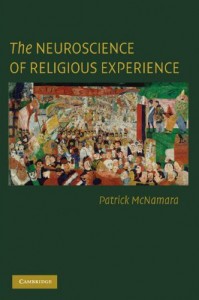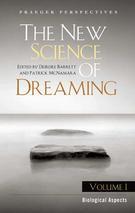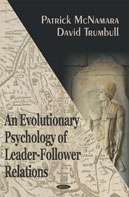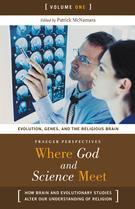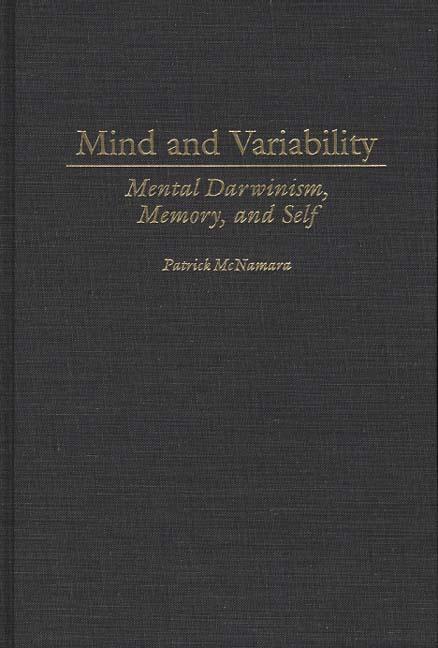Selected Publications
Books
 |
Science and the World’s Religions (3 Volumes) Patrick McNamara and Wesley Wildman (Editors) ABC-CLIO, expected publication date, March 2012 Table of Contents |
|
 |
Encyclopedia of Sleep and Dreams (2 Volumes) Deirdre Barrett and Patrick McNamara (Editors) ABC-CLIO, expected publication date, January 2012 Table of Contents |
|
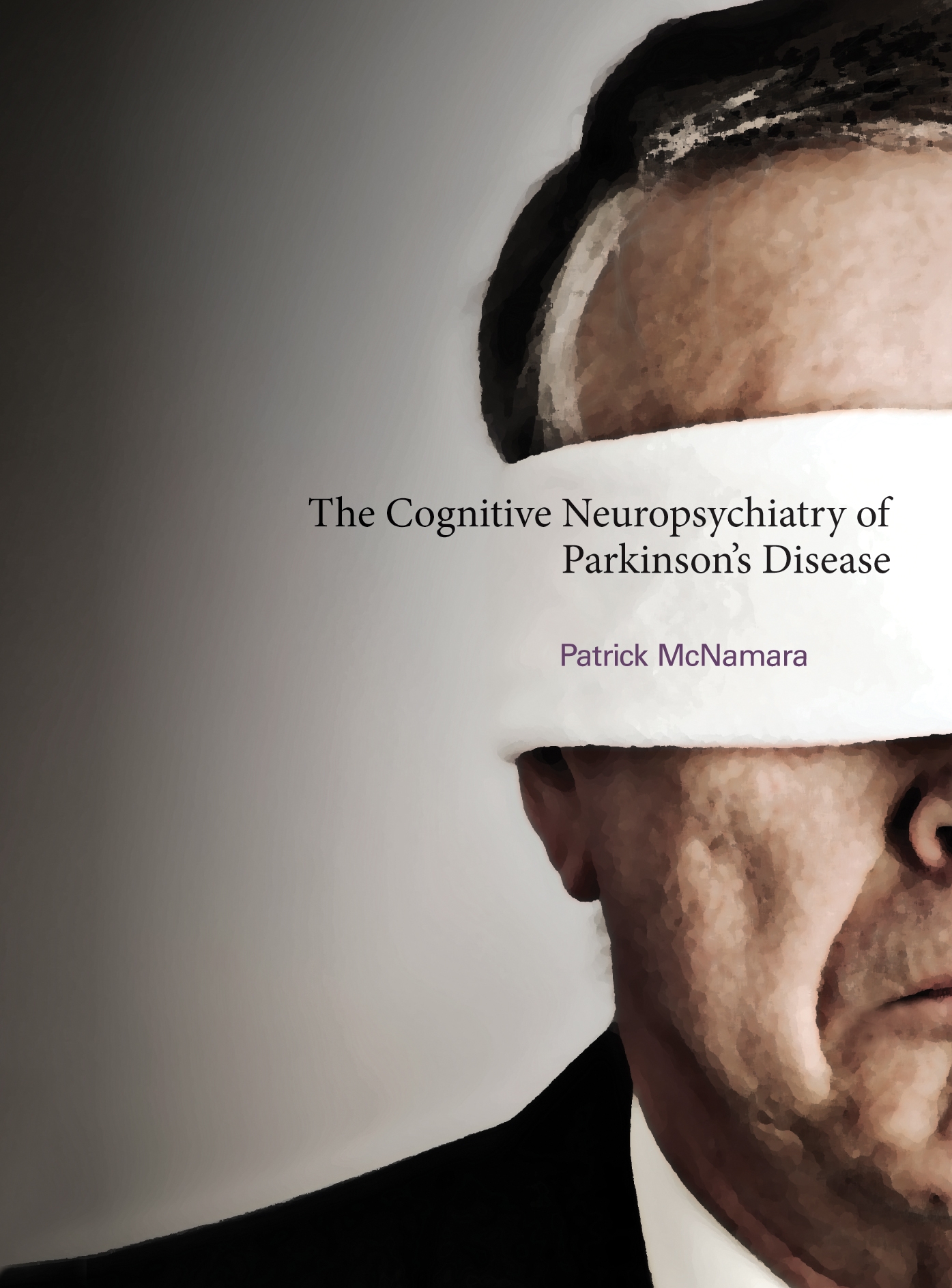 |
The Cognitive Neuropsychiatry of Parkinson’s Disease Patrick McNamara The MIT Press, 2011 Table of Contents |
|
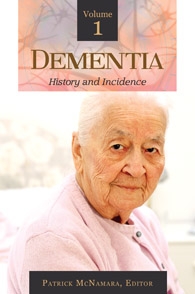 |
Dementia (3 Volumes) Volume I: History and Incidence Volume II: Science and Biology Volume III: Treatments and Developments Patrick McNamara (Editor) ABC-CLIO, 2011 Table of Contents |
|
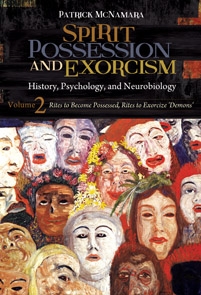 |
Spirit Possession (2 Volumes) Volume I: History and Phenomenology of Positive Spirit Possession Volume II: Demonic Possession and Rites to Exorcize ‘Demons’ Patrick McNamara ABC-CLIO, 2011 Table of Contents |
|
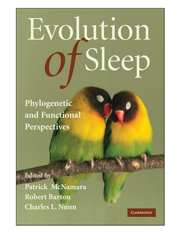 |
Evolution of Sleep: Phylogenetic and Functional Perspectives Patrick McNamara, Charles Nunn, & Robert Barton (Editors) Cambridge University Press, 2010 Table of Contents |
|
| The Neuroscience of Religious Experience Patrick McNamara Cambridge University Press, 2009 Table of Contents |
||
| Nightmares: The Science and Solution of Those Frightening Visions During Sleep Patrick McNamara Praeger Publishing, 2008 Table of Contents |
||
| The New Science of Dreaming (3 Volumes) Volume I: Biological Aspects Volume II: Content, Recall, and personality Correlates Volume III: Cultural and Theoretical Perspectives Deirdre Barrett and Patrick McNamara (Editors) Praeger Publishing, 2007 Table of Contents |
||
| An Evolutionary Psychology of Leader-Follower Relations Patrick McNamara and David Trumbull Nova Science Publishers, 2007 Table of Contents |
||
| Where God and Science Meet: How Brain and Evolutionary Studies Alter Our Understanding of Religion (3 Volumes) Volume I: Evolution, Genes, and the Religious Brain Volume II: The Neurology of Religious Experience Volume III: The Psychology of Religious Experience Patrick McNamara (Editor) Praeger Publishing, 2006 Table of Contents |
||
| An Evolutionary Psychology of Sleep and Dreams Patrick McNamara Praeger Publishing, 2004 Table of Contents |
||
| Mind and Variability: Mental Darwinism, Memory and Self Patrick McNamara Praeger Publishing, 1999 Table of Contents |
Please follow these links for a list of publications related to:
Counterfactuals
Language and Pragmatics
Memory
Organ Donation
Other topics
Parkinson’s Disease
Religion
Sleep and Dreams
For reprints or further information on selected publications, please email Dr. McNamara.
McNamara, P., Durso, R., Brown, A., & Lynch, A. (2003). Counterfactual cognitive deficit in persons with Parkinson’s disease. Journal of Neurology, Neurosurgery, and Psychiatry, 74, 1065-1070.
McNamara, P., Andresen, J., Arrowood, J., & Messer, G. (2002). Counterfactual cognitive operations in dreams. Dreaming, 12(3), 121-133.
McNamara, P. (2000). Counterfactual thought in dreams. Dreaming, 10(4), 232-245.
Top
McNamara, P. (2011). Neurochemistry and language. In P. C. Hogan (Ed.), The Cambridge Encyclopedia of the Language Sciences (pp. 557-558). Cambridge, UK: Cambridge University Press.
Holtgraves, T., & McNamara, P. (2010). Pragmatic comprehension deficit in Parkinson’s Disease. Journal of Clinical and Experimental Neuropsychology, 32(4), 388-397. PMID: 19763993
Holtgraves, T., & McNamara, P. (2010). Parkinson’s disease and politeness. Journal of Language and Social Psychology, 29(2), 178-193.
Holtgraves, T., McNamara, P., Cappaert, K., & Durso, R. (2010). Linguistic correlates of asymmetric motor symptom severity in Parkinson’s Disease. Brain and Cognition, 72(2), 189-196. PMID: 19751960
McNamara, P., Holtgraves, T. Durso, R., & Harris, E. (2010). Social cognition of indirect speech: Evidence from Parkinson’s Disease. Journal of Neurolinguistics, 23(2), 162-171. PMID: 20161657
McNamara, P., & Albert, M. (2004). Neuropharmacology of verbal perseveration. Seminars in Speech and Language, 25(4), 309-321.
McNamara, P., & Durso, R. (2003). Pragmatic communication skills in patients with Parkinson’s disease. Brain and Language, 84, 414-423.
McNamara, P., & Durso, R. (2000). Language functions in Parkinson’s Disease: Evidence for a neurochemistry of language. In L. Obler & L.T. Connor (Eds.), Neurobehavior of language and cognition: Studies of normal aging and brain damage (pp. 201-212). New York: Kluwer Academic Publishers.
McNamara, P., Clark, J., Krueger, M., & Durso, R. (1996). Grammaticality judgments and sentence comprehension in Parkinson’s disease: A comparison with Broca’s aphasia. International Journal of Neuroscience, 86, 151-166.
Mimura, M., McNamara, P., & Albert, M. (1995). Towards a pharmacotherapy for aphasia. In H. Kirshner (Ed.), Handbook of neurological speech and language disorders (pp. 465-482). New York: Marcel Dekker, Inc.
Frazier, L., & McNamara, P. (1995). Favor referential representations. Brain & Language, 49, 224-240.
McNamara, P., Obler, L., Au, R., Durso, R., & Albert, M. (1992). Speech monitoring skills in Alzheimer’s Disease, Parkinson’s disease and normal aging. Brain & Language,42, 38-51.
Shapiro, L., McNamara, P., Zurif, E., Lanzoni, S., & Cermak, L. (1992). Processing complexity and sentence memory: Evidence from amnesia. Brain & Language, 42, 431-453.
Top
McNamara, P., Benson, E., McGeeney, B., Brown, A., & Albert, M. (2005). Modes of remembering in patients with chronic pain: Relation to current pain. Journal of Nervous and Mental Disease, 193(1), 53-57.
McNamara, P. (1999). Mind and variability: Mental Darwinism, memory and self. Westport: Praeger/Greenwood Press. Praeger Publishing
McNamara, P. (1996). Bergson’s “Matter and Memory” and modern selectionist theories of memory. Brain & Cognition, 30, 215-231.
McNamara, P. (1994). Memory, double, shadow and evil. Journal of Analytical Psychology, 39, 233-251.
McNamara, P. (1992). A transpersonal approach to memory. Journal of Transpersonal Psychology, 24(1), 61-78.
McNamara, P., Obler, L., Au, R., Durso, R., & Albert, M. (1992). Speech monitoring skills in Alzheimer’s Disease, Parkinson’s disease and normal aging. Brain & Language,42, 38-51.
Shapiro, L., McNamara, P., Zurif, E., Lanzoni, S., & Cermak, L. (1992). Processing complexity and sentence memory: Evidence from amnesia. Brain & Language, 42, 431-453.
Top
McNamara, P., Guadagnoli, E., Evanisko, M.J., Beasley, C., Santiago-Delpin, E.A., Callender, C.O., & Christiansen, E. (1999). Correlates of support for organ donation among three ethnic minorities. Clinical Transplantation, 13, 45-50.
Guadagnoli, E., Christiansen, C., DeJong, W., McNamara, P., Beasley, C., Christiansen, E., & Evanisko, M. (1999). The public’s willingness to discuss their preference for organ donation with family members. Clinical Transplantation, 13, 1-7.
Helander, K., McNamara, P., Franz, H., & Beasley, C. (1999). Best demonstrated practices in organ donation: Meeting the challenge of the new HCFA regulations. In J. Burns & L.M. Northrup (Eds.), Hospital strategies (pp. 111-140). New York: Faulkner and Gray, Inc.
Guadagnoli, E., McNamara P., Evanisko, M., Beasley, C., Callender, C.O., & Poretsky, A. (1999). The influence of race on approaching families for organ donation and their decision to donate. American Journal of Public Health, 89, 244-247.
Beasley, C., Boyle, C., McNamara, P., & Guardino, S. (1999). Estimating the potential effects of donor registries using a simple analytical model. Transplantation Proceedings, 31, 1701-1702.
Evanisko, M., Beasley, C., Brigham, L., Capossela, C., Cosgrove, G.R., Light, J., Mellor, S., Poretsky, A., & McNamara, P. (1998). Readiness of critical care physicians and nurses to handle requests for organ donation. Journal of Critical Care, 7(1), 4-12.
Gortmaker, S.L., Beasley, C.L., Sheehy, E., Lucas, B.A., Brigham, L.E., Grenvik, A., Patterson, R.H., Garrison, R.N., McNamara, P., & Evanisko, M.J. (1998). Improving the request process to increase family consent for organ donation. Journal of Transplant Coordination, 8(4), 210-217
McNamara P., & Beasley, C. (1997). Determinants of familial consent to organ donation in the hospital setting. In Cecka & Terasaki (Eds.), Clinical transplants 1997 (pp. 219-229). Los Angeles: UCLA Tissue Typing Laboratory.
McNamara P., Franz, H.G., Fowler, R., Evanisko, M.J., & Beasley, C.L. (1997). Medical record review as a measure of the effectiveness of organ procurement practices in the hospital.” Joint Commission Journal on Quality Improvement, 23(6), 321-333.
Top
Assal, F., & McNamara, P. (2008). Spatial perseveration in dementia with Lewy bodies. Behavioural Neurology, 18, 235-236.
Klein, R., McNamara, P., & Albert, M. L. (2006). Neuropharmacologic approaches to cognitive rehabilitation. Behavioural Neurology, 17, 1-3.
McNamara, P., & Trumbull, D. (2006). The evolutionary psychology of leader-follower relations. Hauppauge, NY: Nova Science Publishers, Inc. Nova Science Publishers
McNamara, P., & Albert, M. (2003). Pharmacotherapy of cognition. In K. Heilman & E. Valenstein (Eds.), Clinical neuropsychology (4th ed., pp. 640-656). New York: Oxford.
Oscar-Berman, M., & McNamara, P. (2001). Cognitive changes in aging alcoholics. In R.R. Watson (Ed.), Alcohol and substance abuse in the aged (pp. 21-40). New York: CRC Press.
Oscar-Berman, M., & McNamara, P. (2001). Brain injuries. In W.E. Craighead & C.B. Nemeroff (Eds.), The Corsini Encyclopedia of psychology and behavioral science (3rd ed., vol. 1, pp. 236-237). New York: John Wiley and Sons.
Oscar-Berman, M., & McNamara, P. (2001). Central nervous system disorders. In W.E. Craighead, & C.B. Nemeroff (Eds.), The Corsini Encyclopedia of psychology and behavioral science (3rd ed., vol. 1, pp. 265-267). New York: John Wiley and Sons.
McNamara, P., Oscar-Berman, M., & Albert, M. (2000). Frontal lobe function and pain in the elderly. Journal of Adult Development and Aging, 7(2), 113-119.
McNamara, P., Blum, D., O’Quin, K., & Schachter, S. (1994). Markers of cerebral lateralization and alcoholism. Perceptual & Motor Skills, 79, 1435-1440.
McNamara, P., Flannery, K., Obler, L., & Schachter, S. (1994). Special talents in Geschwind and Galaburda’s theory of cerebral lateralization: An examination in a female population. International Journal of Neuroscience, 78, 167-176.
Tanaka, Y., Miyazaki, M., Kuzuhara, S., McNamara, P., & Albert, M. (1993). The relation between pain and cerebral hemisphere. Neurological Medicine (Tokyo), 39(3), 263-268.
Staveley, H., & McNamara, P. (1993). Warwick Fox’s “Transpersonal Ecology”: A critique and alternative approach. Journal of Transpersonal Psychology, 24(2), 201-211.
Oscar-Berman, M., McNamara, P., & Freedman, M. (1991). Delayed response tasks: Parallels between experimental ablation studies and findings in patients with frontal lesions. In H.S. Levin & H.M. Eisenberg (Eds.), Frontal lobe function and injury (pp. 230-255). Oxford: Oxford University Press.
Top
Butler, P. M., & McNamara, P. (in press). Epigenetic, imprinting and neurobehavioral effects in Parkinson’s disease. In P. McNamara (Ed.), Dementia: Volume 2: Science and biology. Santa Barbara, CA: Praeger Publishers.
McNamara, P., Stavitsky, K., Durso, R., & Harris, E. (2010). The impact of clinical and cognitive variables on social functioning in Parkinson’s disease: Patient versus examiner estimates. Parkinson’s Disease, Article ID 263083, 6 pages.
McNamara, P., Stavitsky, K., Harris, E., Szent-Imrey, O., & Durso, R. (2010). Mood, side of motor symptom onset and pain complaints in Parkinson’s disease. International Journal of Geriatric Psychiatry,25, 519-524. PMID: 19711336
McNamara, P., Durso, R., & Harris, E. (2008). Alterations of the sense of self and personality in Parkinson’s Disease. International Journal of Geriatric Psychiatry. 23,(1), 79-84.
Stavitsky, K., McNamara, P., Durso, R., Harris, E., Auerbach, S., & Cronin-Golomb, A. (2008). Hallucinations, dreaming and frequent dozing in Parkinson’s disease: Impact of right-hemisphere neural networks. Cognitive & Behavioral Neurology, 21(3), 143-149.
McNamara, P., Durso, R., & Harris, E. (2007). ‘Machiavellianism’ and frontal dysfunction: Evidence from Parkinson’s Disease (PD). Cognitive Neuropsychiatry, 12(4), 285-300.
McNamara, P., Durso, R., & Harris, E. (2006). Life goals of patients with Parkinson’s disease: A pilot study on correlations with mood and cognitive functions. Clinical Rehabilitation, 20, 818-826.
McNamara, P., Durso, R., & Brown, A. (2006). Religiosity in patients with Parkinson’s disease. Neuropsychiatric Disease & Treatment, 2(3), 341-348.
McNamara, P., Durso, R., Brown, A., & Harris, E. (2006). The chemistry of religiosity: Evidence from patients with Parkinson’s disease. In P. McNamara (Ed.), Where God and science meet: How brain and evolutionary studies alter our understanding of religion: Volume II: The neurology of religious experience (pp. 1-14). Westport, CT and London: Praeger Perspectives.
McNamara, P., Durso, R., & Harris, E. (2006). Frontal lobe mediation of the sense of self: Evidence from studies of patients with Parkinson’s disease. In A. P. Prescott (Ed.), The concept of self in medicine and health care (pp. 143-161). Hauppauge, NY: Nova Science Publishers, Inc.
McNamara, P., & Durso, R. (2005). Neuropharmacological treatment of mental dysfunction in Parkinson’s disease. Behavioural Neurology, 16, 1-9.
Wegelin, J., McNamara, P., Durso, R., Brown, A., & McLaren, D. (2005). Correlates of excessive daytime sleepiness in Parkinson’s disease. Parkinsonism & Related Disorders, 11, 441-448.
McNamara, P., Durso, R., & Brown, A. (2003). Relation of ‘sense of self’ to executive function performance in Parkinson’s Disease. Cognitive & Behavioral Neurology, 14, 139-148.
McNamara, P., Durso, R., Brown, A., & Lynch, A. (2003). Counterfactual cognitive deficit in patients with Parkinson’s disease. Journal of Neurology, Neurosurgery & Psychiatry, 74, 1065-1070.
McNamara, P., & Durso, R. (2003). Pragmatic communication skills in Parkinson’s Disease. Brain & Language, 84, 414-423.
McNamara, P., Durso, R., & Auerbach, S. (2002). Dopaminergic syndromes of sleep, mood and mentation: Evidence from Parkinson’s disease and related disorders. Sleep and Hypnosis, 4(3), 119-131.
McNamara, P., & Durso, R. (2000). Language functions in Parkinson’s Disease: Evidence for a neurochemistry of language. In L. Obler & L.T. Connor (Eds.), Neurobehavior of language and cognition: Studies of normal aging and brain damage (pp. 201-212). New York: Kluwer Academic Publishers.
McNamara, P., Clark, J., Krueger, M., & Durso, R. (1996). Grammaticality judgments and sentence comprehension in Parkinson’s disease: A comparison with Broca’s aphasia. International Journal of Neuroscience, 86, 151-166.
McNamara, P., von Harscher, H., Scioli, T., Krueger, M., Lawson, D., & Durso, R. (1995). The sense of self after brain damage: Evidence from aphasics and individuals with Parkinson’s disease. Journal of Cognitive Rehabilitation, November/December, 16-23.
McNamara, P., Obler, L., Au, R., Durso, R., & Albert, M. (1992). Speech monitoring skills in Alzheimer’s Disease, Parkinson’s disease and normal aging. Brain & Language, 42, 38-51.
McNamara, P., & Durso, R. (1991). Reversible Othello syndrome in a man with Parkinson’s disease. American Journal of Geriatric Neurology & Psychiatry, 4(3), 157-159.
Top
Butler, P. M., McNamara, P., Durso, R. (in press). Side of onset in Parkinson’s Disease and alterations in religiosity: Novel behavioral phenotypes. Behavioral Neurology.
McNamara, P., & Butler, P. M. (in press). De-personalization and the psychobiology of evil. In J. Harold Ellens (Ed.), Explaining evil. Praeger, CT: Greenwood Press.
McNamara, P., & Butler, P. M. (in press). The neuropsychology of religious experience. In R.F. Paloutzian & C. L. Park (Eds.), The handbook of the psychology of religion, 2nd ed. New York: The Guilford Press.
McNamara, P. (Ed.). (in press). Religious coping strategies in healthy elderly and in those at risk for dementia.In Dementia: Volume 3: Treatments and developments. Santa Barbara, CA: Praeger Publishers.
McNamara, P., & Wildman, W. J. (in press). On religious consciousness. The International Journal for thePsychology of Religion.
McNamara, P., & Burns, J. (in press). Religiosity as protective against addictions in adolescents. In A. Browne- Miller (Ed.), Addictions (4 vols.). Westport, CT: Greenwood Press.
McNamara, P. (2010). The neuroscience of religious experience – A response to the Runyan-Kreitzer review. Christian Scholar’s Review, 39(4), 479-481.
McNamara, P., Burns, J., Johnson, P., & McCorkle, B. H. (2010). How does religiousness protect against risky health behaviors? Psychology of Religion and Spirituality, 2(1), 30-34.
Butler, P. M., McNamara, P., & Durso, R. (2010). Deficits in the automatic activation of religious concepts inpatients with Parkinson’s disease. Journal of the International Neuropsychological Society, 16(2), 252-261. PMID: 19958570
McNamara, P. (In press). The neuroscience of religious experience. New York: Cambridge University Press. Cambridge University Press
Wildman, W., & McNamara, P. (2008). Challenges facing the neurological study of religious behavior, belief and experience. Method & Theory in the Study of Religion, 20, 212-242.
Harris, E., & McNamara, P. (2008). Is religiousness a biocultural adaptation? In J. Bulbulia, R. Sosis, R. Genet, E. Harris, K. Wyman, & C. Genet (Eds.), The evolution of religion: Studies, theories, and critiques. Santa Margarita, CA: Collins Family Foundation.
McNamara, P., & Szent-Imrey, R. (2007). Understanding miracles in relationship to standard religious experiences. In J. H. Ellens (Ed.), The psychology and science of miracle healings, Volume 1: Religious and spiritual events. Westport, CT: Greenwood Press.
McNamara, P. (Ed.). (2006). Where God and science meet: How brain and evolutionary studies alter our understanding of religion (3 volumes). Westport, CT and London: Praeger Perspectives. Praeger Publishing
Emmons, R., & McNamara, P. (2006). Sacred emotions and affective neuroscience: Gratitude, costly-signaling, and the brain. In P. McNamara (Ed.), Where God and science meet: How brain and evolutionary studies alter our understanding of religion: Volume I: Evolution, genes, and the religious brain (pp. 11-30). Westport, CT and London: Praeger Perspectives.
McNamara, P., Durso, R., & Brown, A. (2006). Religiosity in patients with Parkinson’s disease. Neuropsychiatric Disease & Treatment, 2(3), 341-348.
Park, C., & McNamara, P. (2006). Religion, meaning, and the brain. In P. McNamara (Ed.), Where God and science meet: How brain and evolutionary studies alter our understanding of religion: Volume III: The psychology of religious experience (pp. 67-89). Westport, CT and London: Praeger Perspectives.
Paloutzian, R., Swenson, E., & McNamara, P. (2006). Religious conversion, spiritual transformation, and the neurocognition of meaning making. In P. McNamara (Ed.), Where God and science meet: How brain and evolutionary studies alter our understanding of religion: Volume II: The neurology of religious experience (pp. 151-169). Westport, CT and London: Praeger Perspectives.
McNamara, P., Durso, R., Brown, A., & Harris, E. (2006). The chemistry of religiosity: Evidence from patients with Parkinson’s disease. In P. McNamara (Ed.), Where God and science meet: How brain and evolutionary studies alter our understanding of religion: VolumeII: The neurology of religious experience (pp. 1-14). Westport, CT and London: Praeger Perspectives.
McNamara, P. (Ed.). (2006). The frontal lobes, and the evolution of cooperation and religion. In Where God and science meet: How brain and evolutionary studies alter our understanding of religion: Volume II: The neurology of religious experience (pp. 189-204). Westport, CT and London: Praeger Perspectives.
McNamara, P., Andresen, J., & Gellard, J. (2003). Relation of religiosity and scores on fluency tests to subjective reports of health in older individuals. The International Journal for the Psychology of Religion, 13(4), 259-271.
McNamara, P. (2002). The frontal lobes, social intelligence, and religious worship. Ideas for Creative Research in Neurobiology. The John Templeton Foundation (pp. 50-59).
McNamara, P. (2002). The motivational origins of religious practices. Zygon: A Journal of Science and Religion, 37(1), 143-160.
McNamara, P. (2001). Religion and the frontal lobes. In J. Andresen (Ed.), Religion in mind (pp. 237-256). Cambridge: Cambridge University Press.
Top
McNamara, P. (in press). Review of The twenty-four hour mind: The role of sleep and dreaming in our emotional lives by Rosalind Cartwright. Sleep and Hypnosis.
Kookoolis, A., Pace-Schott, E.F., & McNamara, P. (2010). Dream content and memory processing: Dream lag effects within a single night and across several nights. Dreaming, 20(3), 211-217.
McNamara, P., Johnson, P., McLaren, D., Harris, E., Beauharnais, C., & Auerbach, S. (2010). REM and NREM sleep mentation. International Review of Neurobiology, 92, 69-86.
Stavitsky, K., Saurman, J., McNamara, P., & Cronin-Golomb, A. (2010). Sleep in Parkinson’s Disease: A comparison of actigraphy and subjective measures. Parkinsonism and Related Disorders, 16, 280-283. PMID: 20202887
McNamara, P., Barton, R., & Nunn, C. (Eds.) (2010). Evolution of sleep: Phylogenetic and functional perspectives. New York: Cambridge University Press. Cambridge University Press
McNamara, P., Auerbach, S., Johnson, P., Harris, E., & Doros, G. (2010). Impact of REM sleep on distortions of self concept, mood and memory in depressed/anxious participants. Journal of Affective Disorders, 122(3), 198-207. PMID: 19631989
Bernáth, I., McNamara, P., Szternák, N., Szakács, Z., Köves, P., Terray-Horváth, A., & Vida, Z. (2009). Hyperviscosity as a possible cause of positive acoustic evoked potential findings in patients with sleep apnea. Dual electrophysiological and hemorheological study. Sleep Medicine, 10(3), 361-367. PMID: 18656422
Capellini, I., McNamara, P., Preston, B. T., Nunn, C. L., & Barton, R. A. (2009). Does sleep play a role in memory consolidation? A comparative test. PLoS ONE, 4(2), e4609. PMID: 19240803
Preston, B. T., Capellini, I., McNamara, P., Barton, R. A., & Nunn, C. L. (2009). Parasite resistance and the adaptive significance of sleep. BMC Evolutionary Biology, 9, 7. PMID: 19134175
McNamara, P. (2008). Nightmares: The science and solution of those frightening visions during sleep. Westport, CT: Praeger Perspectives. Praeger Publishing
Acerbi, A., McNamara, P., & Nunn, C. L. (2008). To sleep or not to sleep: The ecology of sleep in artificial organisms. BMC Ecology, 8(10).
Stavitsky, K., McNamara, P., Durso, R., Harris, E., Auerbach, S., & Cronin-Golomb, A. (2008). Hallucinations, dreaming and frequent dozing in Parkinson’s disease: Impact of right-hemisphere neural networks. Cognitive & Behavioral Neurology, 21(3), 143-149.
Capellini, I., Nunn, C. L., McNamara, P., Preston, B. T., & Barton, R. A. (2008). Energetic constraints, not predation, influence the evolution of sleep patterning in mammals. Functional Ecology, 22(5), 847-853.
Capellini, I., Barton, R. A., Preston, B., McNamara, P., & Nunn, C. L. (2008). Phylogenetic analysis of the ecology and evolution of mammalian sleep. Evolution, 62-7, 1764-1776.
McNamara, P., Capellini, I., Harris, E., Nunn, C. L., Barton, R. A., & Preston, B. (2008). The phylogeny of sleep database: A new resource for sleep Scientists. The Open Sleep Journal, 1, 11-14.
McNamara, P., McLaren, D. & Durso, K. (2007). Representation of the Self in REM and NREM Dreams. Dreaming, 17(2): 113-126.
Barrett, D., & McNamara, P. (Eds.). (2007). The new science of dreaming (3 volumes). Westport, CT and London: Praeger Perspectives. Praeger Publishing
McNamara, P., Nunn, C., Barton, R., Harris, E., & Capellini, I. (2007). Phylogeny of sleep and dreams. In D. Barrett & P. McNamara (Eds.), The new science of dreaming (Volume I, Chp. 3). Westport, CT and London: Praeger Perspectives.
McNamara, P., Harris, E., & Kookoolis, A. (2007). Costly signaling theory of dream recall and dream sharing. In D. Barrett & P. McNamara (Eds.), The new science of dreaming (Volume III, Chp. 7). Westport, CT and London: Praeger Perspectives.
McNamara, P., McLaren, D., Kowalczyk, S., & Pace-Schott, E. (2007). ‘Theory of Mind’ in REM and NREM dreams. In D. Barrett & P. McNamara (Eds.), The new science of dreaming (Volume I, Chp. 13). Westport, CT and London: Praeger Perspectives.
McNamara, P., & Szent-Imrey, R. (2007). Costly signaling theory of REM sleep and dreams. Evolutionary Psychology, 5(1), 28-44.
Wegelin, J., McNamara, P., Durso, R., Brown, A., & McLaren, D. (2005). Correlates of excessive daytime sleepiness in Parkinson’s disease. Parkinsonism & Related Disorders, 11, 441-448.
McNamara, P., McLaren, D., Smith, D., Brown, A. & Stickgold, R. (2005). A “Jekyll and Hyde” within: Aggressive versus friendly social interactions in REM and NREM dreams.” Psychological Science, 16(2), 130-136.
McNamara, P. (2004). Genomic imprinting and neurodevelopmental disorders of sleep. Sleep and Hypnosis, 6(2), 82-90.
McNamara, P. (2004). An evolutionary psychology of sleep and dreams. Westport: Praeger/Greenwood Press/Praeger. Praeger Publishing
McNamara, P., Belsky, J., & Fearon, P. (2003). Infant sleep disorders and attachment: Sleep problems in infants with insecure-resistant versus insecure-avoidant attachments to mother. Sleep & Hypnosis, 5(1), 7-16.
McNamara, P., Durso, R., & Auerbach, S. (2002). Dopaminergic syndromes of sleep, mood, and mentation: Evidence from Parkinson’s disease and related disorders. Sleep & Hypnosis, 4(4), 119-131.
McNamara, P., Dowdall, J., & Auerbach, S. (2002). REM sleep, early experience, and the development of reproductive strategies. Human Nature, 13(4), 405-435.
McNamara, P., Andresen, J., Arrowood, J., & Messer, G. (2002). Counterfactual cognitive operations in dreams. Dreaming, 12(3), 121-133.
McNamara, P., Andresen, J., Clark, J., Zborowski, M., & Duffy, C. (2001). Impact of attachment styles on dream recall and dream content: A test of the attachment hypothesis of REM sleep. Journal of Sleep Research, 10, 117-127.
McNamara, P. (2000). Counterfactual thought in dreams. Dreaming, 10(4), 232-245.
Zborowski, M., & McNamara, P. (1998). Attachment hypothesis of REM sleep: Toward an integration of psychoanalysis, neuroscience, and evolutionary psychology and the implications for psychopathology research. Psychoanalytic Psychology, 15(1), 115-140.
McNamara, P., Clark, J., & Hartmann, E. (1998). Handedness and dream content. Dreaming, 8(1), 15-22.
McNamara, P. (1996). Bergson’s theory of dreaming. Dreaming, 6(3), 173-186.
McNamara, P. (1996). REM sleep: A social bonding mechanism. New Ideas in Psychology, 14(1), 35-46.
Top
